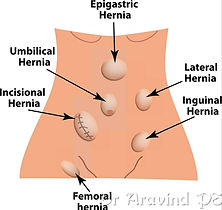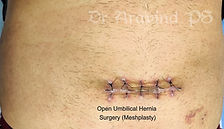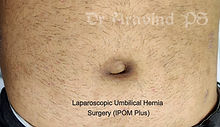
Dr. Aravind P.S.
MBBS, MS (General Surgery), M.Ch. (Surgical Gastroenterology), FMAS, FIAGES
Consultant Surgical Gastroenterologist
Laparoscopic Surgeon
Laser Surgeon
GI & HPB OncoSurgeon
hernia

-
A hernia occurs when the intestines or any structure protrudes through the weakness or defect in the abdominal wall
-
The abdominal wall or groin regions are the common sites of hernia. They can also occur inside the abdomen, called as internal hernia
-
Hernia can be congenital or acquired. Hernias are classified based on the anatomical location
-
Hernias are more common in males than females
-
Almost all hernias require a surgical repair, as spontaneous closure of defect is very rare except infantile umbilical hernia where defect closure can occur up to 4-5 years of age
-
With the improvements in surgical techniques and availability of better instruments now a days hernia surgeries are increasingly done by laparoscopic methods
What is congenital hernia?
-
Hernia which are present since birth Eg.- infantile umbilical hernia
What is acquired hernia?
-
Hernia which develops any time after birth (which are not present at birth)
Is hernia a tumor?
-
No. Hernia is not a tumor. It is a bulge that looks like a tumor
What is external hernia?
-
Hernia bulge which can be seen from outside
-
For example- all abdominal wall hernias
What is internal hernia?
-
Hernia which occurs inside the abdomen (can not be seen from outside)
-
For example- Diaphragmatic hernia, para-duodenal hernia, hiatal hernia etc.
Why does anyone develop hernia?
-
Hernia occurs whenever there is weakness or defect in the wall
-
So, any conditions which weakens or put pressure on the abdominal wall for a prolonged period may lead to hernia
-
Straining on the toilet (Chronic constipation)
-
Chronic cough
-
Enlarged prostate / Straining to urinate
-
Obesity
-
Ascites / Abdominal fluid
-
Pregnancy
-
Lifting heavy weights
-
Poor nutrition
-
Smoking
-
How to prevent hernia ?
-
Avoid smoking
-
Healthy diet and regular exercises to maintain ideal body weight
-
Plenty of liquids, fruits, vegetables and whole grains to avoid constipation
-
Early treatment of persistent cough/constipation/prostate problems
-
Avoid lifting weights that are too heavy
What is incisional hernia?
-
Hernia which occurs through the site or scar of previous surgery
What is traumatic hernia?
-
Hernia which occurs as a result of trauma
-
For example- blunt abdominal trauma, sharp injury to abdomen etc.
What is recurrent hernia?
-
Hernia which recurs after previous hernia surgery
What are the types of hernias depending on the site?
-
Hernias can be classified according to the site of occurrence
-
Epigastric hernia- Epigastrium
-
Umbilical hernia - Through umbilicus
-
Para- umbilical hernia - around the umbilicus
-
Groin hernias
-
Inguinal hernia - through inguinal canal
-
Femoral hernia - through femoral canal
-
-
Spigelian hernia- through spigelian fascia
-
Lumabar hernia - through lumbar region
-
Obturator hernia - through obturator canal
-

What are the symptoms of hernia?
-
Swelling / bulge (increases after straining, standing, cough etc.)
-
Pain
-
Fever, vomiting and constipation in case of complicated hernia
How hernia is diagnosed?
-
Hernia is mainly diagnosed by clinical examination
-
Ultrasonography or CT scan are required in some cases
How hernia is treated?
-
By surgery (with ot without mesh)
Can hernia be treated with medications?
-
No. Surgery is the option
Can hernia surgery be done laparoscopically?
-
Yes. Hernia can be repaired by both open and laparoscopic surgery
What are the different types of hernia surgery/repair?
-
Herniotomy - Only sac containing the hernia is excised ( eg.- congenital hernia in infants and children)
-
Herniorrhaphy - In addition to excision of sac, wall is strenghtened by tissue aproximation
-
Hernioplasty (Meshplasty) - sac excision + wall strenghthening by using a mesh

My doctor told me that I have hernia. when should I undergo surgery?
-
In complicated hernia surgery should be done immediately
-
In non complicated hernia it should be done as early as possible to prevent complications
What are the precautions I should take after hernia surgery?
-
To avoid any manoeuvre that increases intra abdominal pressure for at least 3 to 6 months
-
For example- Lifting heavy weight, chronic cough, chronic constipation etc.
What are the advantages & disadvantages of laparoscopic hernia surgery?
-
Advantages
-
Cosmetically better especially in young patients
-
Less pain
-
Less wound infection
-
Early return to work
-
Disadvantages
-
Costlier than open surgery
-
Need for experienced laparoscopic surgeon with adequate skills


What are the commonly done laparoscopic hernia surgeries?
For groin /inguinal hernias
-
TEP - Total Extra Peritoneal repair
-
TAPP - Trans Abdominal Pre Peritoneal repair
For abdominal wall hernias
-
IPOM & IPOM plus - Intra peritoneal Onlay Mesh plasty etc.





